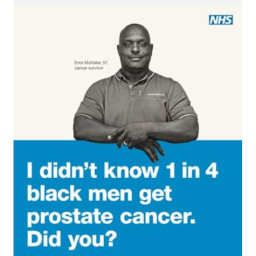1 in 4 black men will get prostate cancer in their lifetime. Black men are more likely to get prostate cancer than other men, who have a 1 in 8 chance of getting prostate cancer.
You may also be more likely to get prostate cancer as a black man if:
- you are aged 45 or over – and your risk increases as you get older
- your father or brother has had it.
I’m a black man over 45. What should I do next?
Speak to your GP about your risk of prostate cancer, even if you don’t have any symptoms.
Remember to tell them if any men in your family have had prostate cancer. You can also call our Specialist Nurses or chat to them online.
Why would I go to my GP if I don’t have any symptoms?
Most men with early prostate cancer (cancer that’s contained inside the prostate) don’t have any symptoms. Symptoms usually develop if the cancer spreads out of the prostate and into nearby areas or around the body.
If you do have prostate cancer and it’s caught early before it causes symptoms, there’s a good chance treatment could stop the cancer spreading. It may not be possible to cure your cancer but you may be able to have treatment to help control the cancer and manage symptoms.
There are advantages and disadvantages of having tests for prostate cancer. Talk to your doctor or nurse about these. Or speak to our Specialist Nurses.
What will happen if I go to my GP?
Your GP will talk to you about your risk of prostate cancer and the tests you can have to diagnose it. Your GP may make an appointment for you to see a specialist at the hospital.
It’s natural to feel worried or embarrassed about going to the doctor or having tests. But don’t let that stop you going to your GP. Remember, the tests give your GP the best idea about whether you have a problem that needs treating.
What can I do if my doctor won't give me a test?
If you’re a black man over 50, you have the right to a PSA test if you've thought carefully about the advantages and disadvantages.
If your GP doesn't agree to give you a PSA test, you can ask to see another GP or practice nurse, or make a complaint.
If you’re a black man aged 45-49, you aren’t entitled to a PSA test until you’re 50. But, because you’re at higher risk, many health professionals believe that you should be able to have tests from the age of 45 if you've thought about the advantages and disadvantages. We have guidelines for health professionals that explain this. It might help to show these to your GP or practice nurse. Or ask to see another GP or practice nurse.
If you’re a black man aged 40-44, you aren’t entitled to a PSA test until you’re 50. But some health professionals believe that you should think about asking for a baseline PSA test. This might help to work out your risk of getting prostate cancer in future. We have guidelines for health professionals that explain this. It might help to show these to your GP or practice nurse. Or ask to see another GP or practice nurse.
If you’re a black man under 40, you could consider asking for a baseline test when you are 40.
I’m a black man under 45. What can I do?
When you’re 45, speak to your GP about your risk of prostate cancer.
If you’re aged 40-44, you could think about asking for a PSA test to help work out your risk of getting prostate cancer in the future. The aim of a baseline test is not to help diagnose prostate cancer, but to help work out your risk of getting prostate cancer in the future.
There is some research suggesting that your PSA level in your 40s could be used to predict how likely you are to get prostate cancer, or fast-growing (aggressive) prostate cancer, later in life. If the test suggests you’re at higher risk, you and your doctor may decide to do regular PSA tests. This might be a good way to spot any changes in your PSA level that might suggest prostate cancer.
However, we don’t yet know exactly what PSA level in your 40s would show an increased risk of prostate cancer, or how often you should have more tests. Because of this, baseline testing isn’t very common in the UK.
Your GP doesn’t have to give you a baseline PSA test. If your GP won’t give you a test, read about what you can do.
Information copied from: https://prostatecanceruk.org/prostate-information/are-you-at-risk/black-men-and-prostate-cancer

